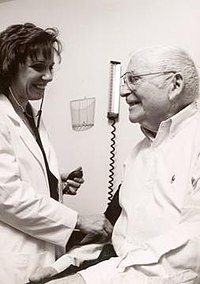
Photo from wikipedia
To the Editor: I applaud the authors’ commentary highlighting the need to increase addiction care in the hospital (Braithwaite and Nolan, 2019). I agree that lack of training is a… Click to show full abstract
To the Editor: I applaud the authors’ commentary highlighting the need to increase addiction care in the hospital (Braithwaite and Nolan, 2019). I agree that lack of training is a barrier and propose that increasing addiction care in the hospital setting will be best accomplished by focusing on primary care training. Approximately 19.7 million people aged 12 or older had a substance use disorder (SUD) in the past year; we need more than addiction specialists to treat this 7.2% of the population (Substance, 2019). Now is the time to enhance addiction medicine training by focusing on family and internal medicine physicians because they are at the frontline of SUD care, are more accessible than subspecialists, care for patients in the hospital setting, can routinely screen patients for SUDs, and can manage SUDs as chronic conditions. The majority of primary care physicians (PCPs) recognize their crucial role in the SUD epidemic. The authors cited data from 20 years ago, describing primary care physicians’ (PCPs) experiences with and attitudes towards SUD treatment. DeFlavio et al. more recently surveyed 108 family physicians and found that 80% regularly saw patients with opioid use disorder, 10% prescribed buprenorphine, and 70% felt it was their responsibility to treat opioid addiction (DeFlavio et al., 2015). The PCPs are experts in preventive care. We can implement evidencebased recommendations, including the recent US Preventive Services Task Force (USPSTF) draft grade B recommendation to screen all adults for illicit drug use (USPSTF, 2019). Universal training of PCPs in addiction medicine would quickly increase the workforce that would routinely screen and initiate treatment for SUDs in hospital and outpatient settings. Additionally, PCPs are authorities in chronic disease management. The 2016 Surgeon General’s report emphasizes that addiction is a chronic neurological disorder and should be addressed with a chronic care management approach (US Department of Health & Human Services, 2016). Like hypertension and diabetes, SUDs can be successfully managed by PCPs using behavioral interventions, medication, and social services. Management by PCPs also normalizes SUDs as chronic diseases, which may decrease the negative bias that Braithwaite et al. reported for emergency and internal medicine physicians (Braithwaite and Nolan, 2019). Addiction care should be part of training in all primary care residency training programs. At our communitybased, university-affiliated family medicine residency program, we not only diagnose and initiate treatment for patients with SUDs in the hospital setting, but also maintain treatment and support after discharge. As residencies integrate the Accreditation Council for Graduate Medical Education’s (ACGME) SUD curriculum into their programs, they can create comprehensive addiction medicine opportunities during emergency, hospital and outpatient rotations. A critical next step in addressing the paucity of addiction care in the hospital setting is to universally train primary care physicians in addiction medicine. PCPs are a sustainable solution to our country’s SUD crisis. We can advocate for and support patients with SUDs from diagnosis and treatment initiation in the hospital to long-term treatment in our offices.
Journal Title: Journal of Addiction Medicine
Year Published: 2020
Link to full text (if available)
Share on Social Media: Sign Up to like & get
recommendations!